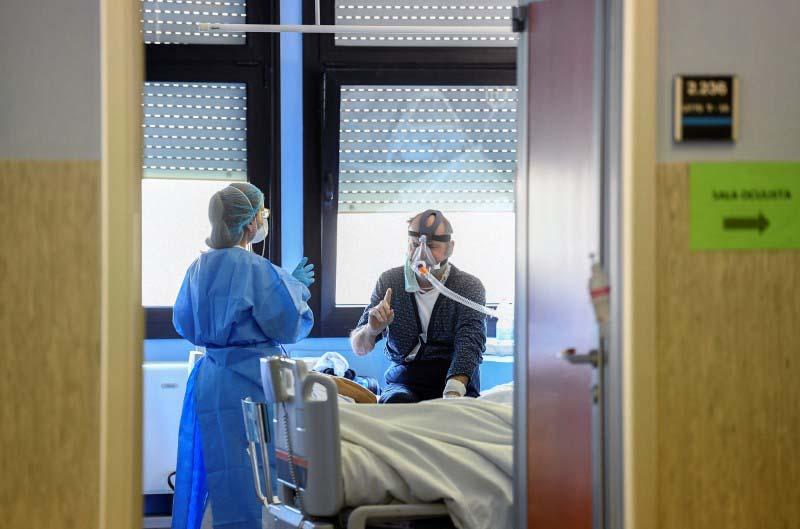Deaths from COVID-19 continue to mount in Italy. The area around Bergamo, in northern Italy, is the hardest hit.
Over the weekend, trucks from the Italian army were seen transporting coffins from there to other regions because local crematories can’t keep up.
Italy has suffered the world’s deadliest outbreak of the respiratory pandemic with at least 6,077 people dead as of Monday, most of them in Lombardy, the wealthy northern region anchored by the country’s financial capital Milan.
A government decree signed on Sunday said all but “essential” businesses must close until April 3 and set out a long list of exceptions deemed vital to keep Italy’s supply chain running.
Related: COVID-19: The latest from The World
Some of the patients in hospitals now are themselves health workers who got sick while caring for people with coronavirus, said Dr. Stefano Magnone, a doctor at the Papa Giovanni XXIII hospital in Bergamo.
“Some of them are in the ICU as patients. We are seeing many doctors falling ill with this infection,” Magnone said. “The majority of them is at home with mild symptoms, but a small number of them are in the ICU.”
Magnone spoke to The World’s host Marco Werman on the health risks for workers on the front lines of the novel coronavirus.
Related: ‘Social isolation’ is the only way to stop coronavirus, says Italian doctor
Marco Werman: How do you fill the holes when those doctors fall sick?
I think every doctor can feel the fear of getting sick with this virus. It doesn’t forgive anyone. Nurses. Young people. Elderly. So we know that the majority of the deaths are elderly. But we can experience the fear.
We have more or less 80 beds in the ICU, all of them are occupied by patients with the virus. And we are opening a new ward in the hospital for more patients. The same situation is in all the hospitals of the east part of Lombardy.
How were the other doctors at the hospital and other medical professionals coping right now?
Well, we were recruited more or less 40 new doctors in our hospital. Two fields hospitals are being under construction these days, one in Milano and one here in Bergamo.
We’re hearing about awful existential decisions that doctors are having to make. For example, not giving a ventilator to people over 60, if there’s a choice between giving it to somebody who’s younger and in a bad situation. So what kind of choices have you and your colleagues been forced to make recently?
Well, I read this kind of news, but I’m not sure that that’s true. Because I mean, the age is not a single factor for you to decide which patient has to go to intubation or not. We are experiencing a lack of resources. This is true. Some of the patients that need ICU beds are sent to other regions in the south, which at the moment has the capability to cope with the patients that we are not in the position to treat. It’s very difficult to set a line for this kind of decision. So we are trying to do the best for everyone.
Well, thank you very much for clarifying that. So, the fact that you’re sending some patients to the south of Italy in the middle of this lockdown, that would suggest that they have the space and the capacity to help people. So, would say this lockdown — the effects of it — are working?
This is hopeful — because we are not until now seeing the benefits of the lockdown, because, as far as we know, the incubation period is maybe more than 14 days. Yesterday, we saw a difference in the rising of the new patients. So, I mean, a single day is not too significant, but we are reaching the end of the second week from the lockdown. So we have to be optimistic in that.
To that point, the rate of mortality in Italy has surpassed most other countries in the world. Can you help us understand why?
This is a very difficult question. We see a very high absolute number of deaths. This is true. But we don’t know how many people got the infection. We don’t know that. So it’s very difficult…at the moment to have a correct rate of deaths.
Right. Finally, doctor, what message do you have for those of us here in the United States, given that this country seems to be just a couple of weeks behind the terrifying trajectory that Italy has followed?
The only thing that people have to do is to stop working, to stay at home and try to see no one for the next two to three weeks. Testing is very important, if you had to identify the contacts and separate the positive patients. But the main thing to do is to isolate all the people [from] each other.
Stay at home and see no one for the next two or three weeks.
I think so, yeah. We didn’t lock down all the country as a first decision. No one has the right decision in their pocket. I mean, it is is a completely new disease, so it’s very difficult.
This interview has been condensed and lightly edited for clarity. Reuters contributed reporting.
